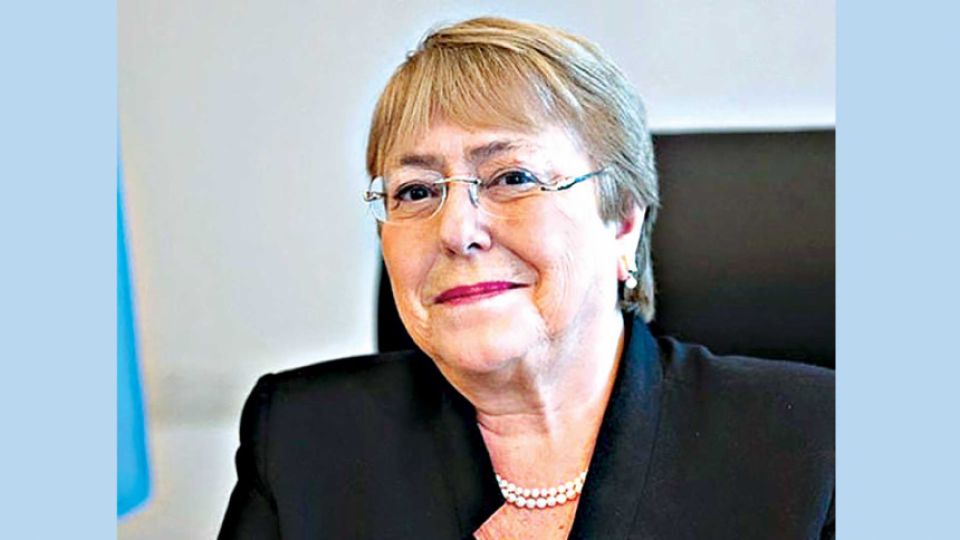August 16, 2022
DHAKA – Rights activists yesterday urged the visiting UN human rights chief to impress upon the government the need for an independent commission to investigate extrajudicial killings and enforced disappearances.
“I raised issues of proper elections — how having a free and fair election is not enough unless accountability to the public is ensured. I spoke about the culture of impunity.”
An activist on what s/he said during a meeting with the UN human rights chief
Around 20 rights activists met UN High Commissioner for Human Rights Michelle Bachelet at a city hotel in the morning, on the second day of her four-day visit.
“This was a strong recommendation. They [activists] stressed that the enquiry commission’s investigation should be of international standard,” said one of the activists who attended the meeting.
On her first official visit to Bangladesh, Bachelet arrived in Dhaka on Sunday morning and held meetings with four top ministers.
Her visit is considered significant following the US sanctions on Rab and seven of its former and current top officials over allegations of human rights violations last December.
The government has denied allegations of enforced disappearances and extrajudicial killings.
Activists have said the situation has improved since then with almost no extrajudicial killings and disappearances.
Yesterday, after the meeting with the rights groups, Bachelet took a flight to Cox’s Bazar in the evening to visit the Rohingya camps.
The UN High Commissioner’s office tweeted that she had important exchanges with a diverse range of civil society actors in Dhaka.
“Civil society needs the space, and enabling conditions, to play their crucial role in identifying and helping resolve #HumanRights challenges,” she tweeted.
A few of those present at the meeting said they also talked about the situation in the Chittagong Hill Tracts, the rights of people with disabilities and those belonging to minority communities, and the Digital Security Act (DSA).
The activists told this paper that they also told Bachelet how human rights defenders and journalists face obstacles in doing their jobs, and the politicisation of the judiciary.
“We said [Bangladesh] is now a police state, not a people’s state,” said Sanjida Islam Tulee, sister of an opposition official who has been missing since allegedly being abducted by Rab in 2013, reports AFP.
“We said more than 600 people have become victims of enforced disappearances by state agencies,” said Tulee, coordinator of Mayer Daak, a platform that represents hundreds of victims of disappearances and their families, and those allegedly killed in staged police encounters.
Another activist told The Daily Star that during the meeting they told the rights chief that the government should empty the “secret detention cells” run by the government and law enforcement and intelligence agencies, and stop lying about such centres.
They also told Bachelet of their demand that the government allow families of victims of enforced disappearances to pursue justice without fear of reprisals, and accept cases as enforced disappearances instead of forcing families to file “missing person” cases.
The rights activists also shared with Bachelet their demand that the government make public the conversation and engagement the international community is having with the government agencies on this matter.
An activist also told Bachelet that the UN Human Rights Office should create an investigative mechanism involving senior judicial and civil society members and a UN special rapporteur.
After the meeting with the UN human rights chief, rights activist Sara Hossain told journalists that the organisations working on human rights and legal aid freely discussed the challenges they face while working here.
Nijera Kori Coordinator Khushi Kabir told Somoy TV that they informed Bachelet about the strong and weak aspects of human rights in Bangladesh.
Environmental lawyer Syeda Rizwana Hasan said they discussed the challenges of working on human rights, good governance and democracy, and that the international rights bodies have a role to play in these cases.
“I have spoken of environment, good governance and accountability,” she said.
“I raised issues of proper elections — how having a free and fair election is not enough unless accountability to the public is ensured. I spoke about the culture of impunity,” another activist said.
They also told Bachelet that incidents of disappearances and killings increase before and after national elections, and this must end.
“We hope Bangladesh’s engagement with the UN Human Rights Office will have reflections in actions,” the activist said.
Talking to reporters yesterday, State Minister for Foreign Affairs Shahriar Alam said when it comes to human rights, some people only talk about one or two issues, but it is an issue that has a broad canvas.
“Poverty-induced migrants, climate-induced poverty, displacement due to wars, impunity of the political killers, sheltering killers in foreign land — all these are violations of human rights. We hope these will also be taken into consideration,” he said at Dhanmondi 32 after paying homage to the portrait of Father of the Nation Bangabandhu Sheikh Mujibur Rahman.
On Sunday, Foreign Minister AK Abdul Momen told Bachelet that there is no such thing called “enforced disappearance” and that something like “extrajudicial killings” might have happened between 2003 and 2005, but not after that.
Home Minister Asaduzzaman Khan had told her that some people disappear after committing crimes, having family conflicts or becoming bankrupt.
The ministers also told Bachelet about how Bangladesh has suffered from terrorism and violence, that the media and civil society are free and vibrant, while seeking her help in repatriating Rohingyas to Myanmar.


